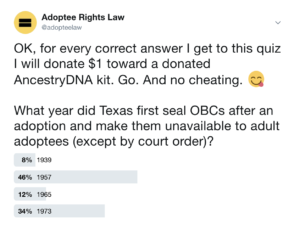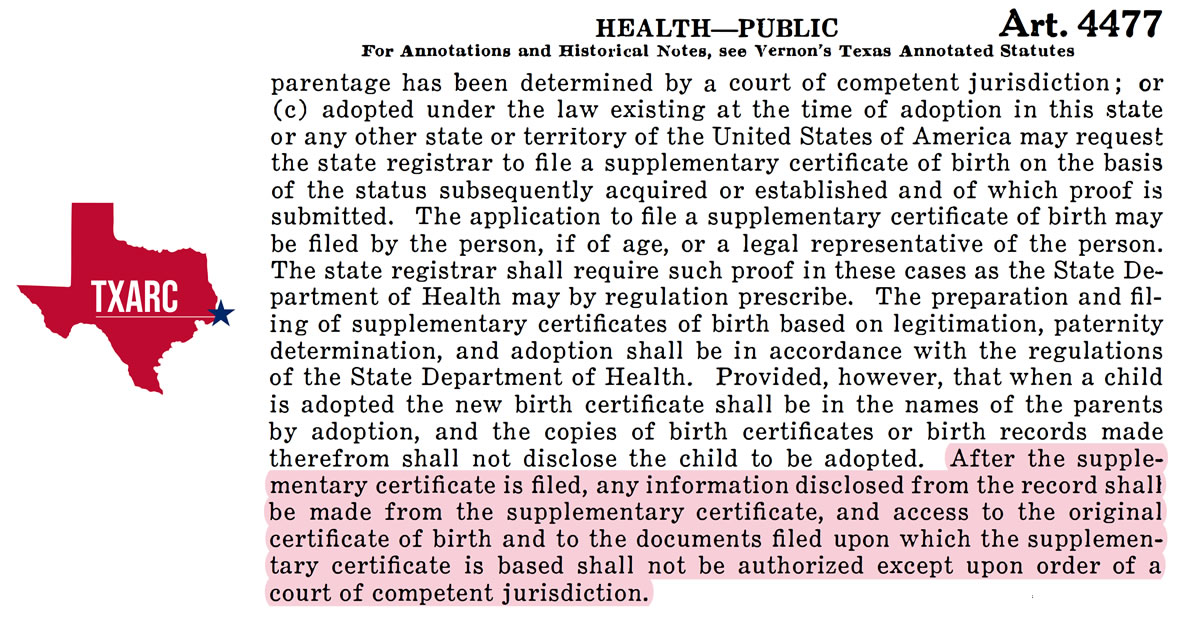The answer is 1957. That’s when Texas began to seal original birth certificates after adoptions and make them unavailable to adult adopted persons later, unless you got a court order. The year is not 1973, as is mentioned by some advocates and in various places online. That year—1973— only began the process of consolidating “adoption records” into one central file, overseen for years by the Department of Public Welfare but managed today by the Bureau of Vital Statistics. Adoption records, however, are not vital records, and it complicates and confuses the fight for equality when we lump a birth record into files directly related to adoption. Adoption records generally include adoption agency files as well as confidential court records. A vital record is much simpler: a government issued death record, for example. Or, in our context, a factual government record of birth, independent of adoption.
 The Texas legislature enacted SB167 in 1957, which for the first time required a court order for an adult adoptee to obtain a copy of the adoptee’s own sealed original birth certificate. The new law became effective in May 1957, meaning adoptee inequality has been the norm in Texas for more than 60 years.
The Texas legislature enacted SB167 in 1957, which for the first time required a court order for an adult adoptee to obtain a copy of the adoptee’s own sealed original birth certificate. The new law became effective in May 1957, meaning adoptee inequality has been the norm in Texas for more than 60 years.
Up until 1957, Texas law had provided that:
After the supplementary certificate is filed, any information disclosed from the record shall be made from the supplementary certificate, and access to the original certificate of birth and to the documents filed upon which the supplementary certificate is based shall be authorized upon the request of the person, if of legal age, his legal representative or upon order of a court of competent jurisdiction.
Upon enactment in 1957, the new law made critical changes, noted here in red:
After the supplementary certificate is filed, any information disclosed from the record shall be made from the supplementary certificate, and access to the original certificate of birth and to the documents filed upon which the supplementary certificate is based shall not be authorized upon the request of the person, if of legal age, his legal representative or except upon order of a court of competent jurisdiction.
Texas was not an outlier. Many states by the mid-1950s had already sealed the OBC from adult adoptees, beginning with California in 1935 and New York in 1936. Washington D.C. followed in 1937, though with certain exceptions D.C. left pre-1937 birth records open and available to the adoptee, even to this day.
It’s not 1973. It’s 1957. And a vital record is not an adoption record. Let’s work to keep that important distinction in our advocacy.
Gregory Luce is a lawyer and the founder of Adoptee Rights Law Center, which is a core partner in the Texas Adoptee Rights Coalition.


 The Texas Adoptee Rights Coalition is a coalition of Texas and national organizations working to secure the right of all Texas adult adoptees to obtain their own original birth certificates, without discriminatory restrictions.
The Texas Adoptee Rights Coalition is a coalition of Texas and national organizations working to secure the right of all Texas adult adoptees to obtain their own original birth certificates, without discriminatory restrictions.